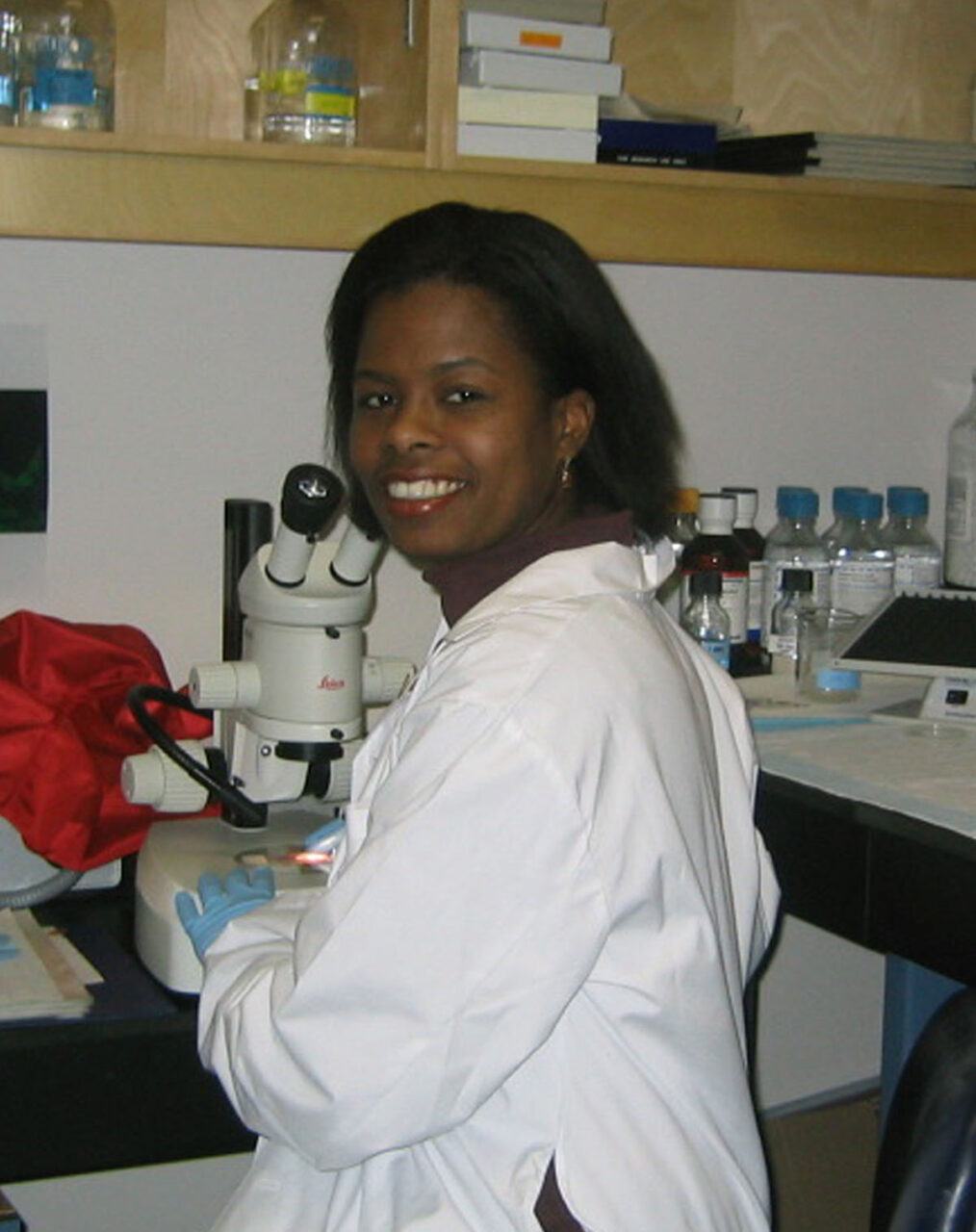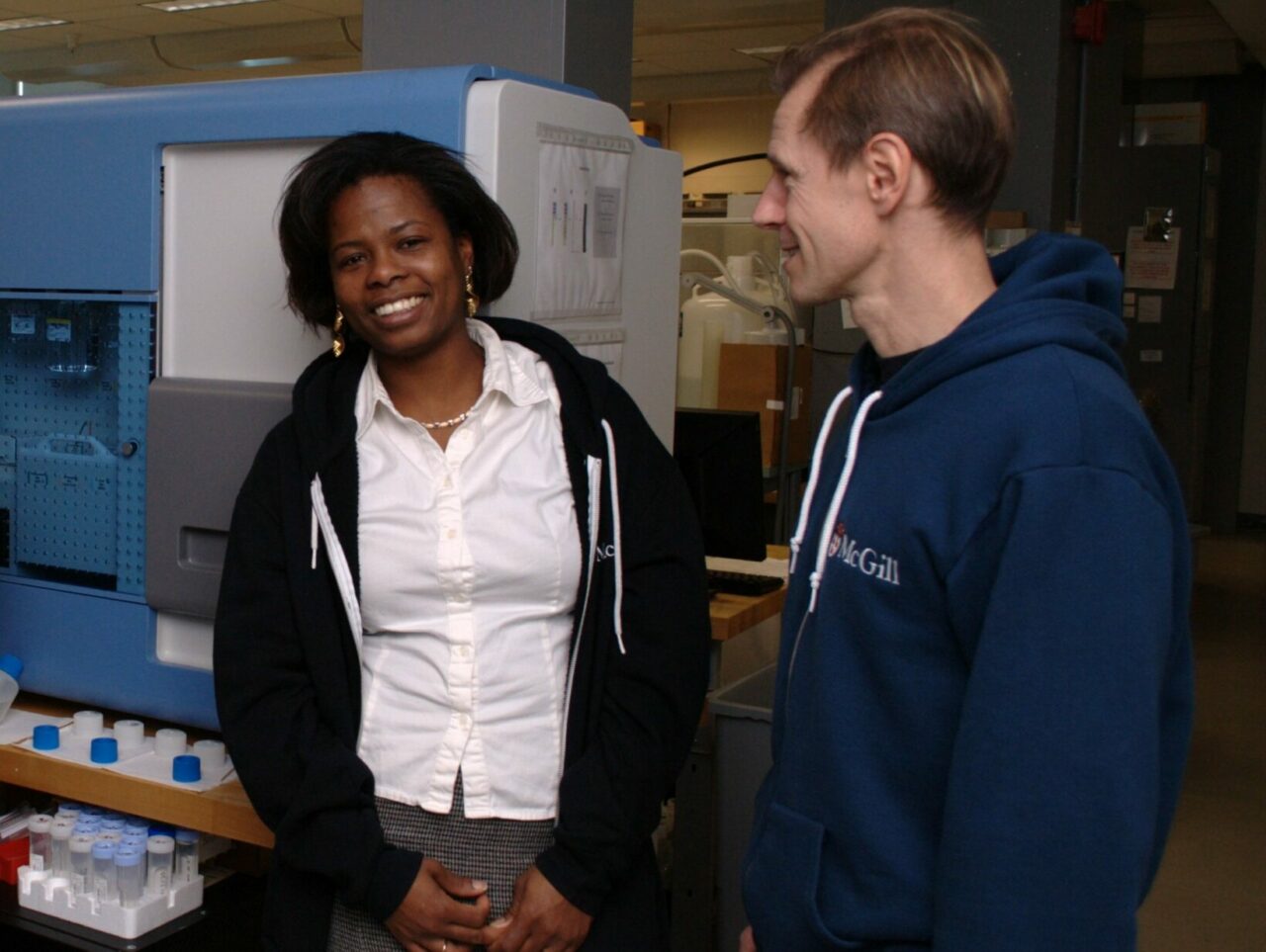By Sol Inés Peca
Loydie Jerome-Majewska’s days are filled with attempts to strike the perfect balance between writing grants and papers, running a research lab, having a personal life and raising healthy, happy children. As February – Black History Month – winds down, she makes time in her exceptionally busy schedule to share her past with her two young boys. “During Black History Month, I do take the time to talk to my sons about my birth country and the struggle the people of colour have had to go through to be where they are today,” says Jerome-Majewska, who is Haitian by birth and married to fellow McGill researcher, Jacek Majewski, originally from Poland.

Jerome-Majewska is Assistant Professor in the Department of Pediatrics and Associate Member of the Department of Human Genetics at McGill. Her professional focus is on the earliest stages of human development, researching the mechanisms that control organ formation during the fetal period. When she looks into a microscope, the cells she sees are void of colour or race. They are cells all humans need before they can be born, which still too often means into a society tainted by racial discrimination. Jerome-Majewska hopes that one day that reality will change, and that her grandchildren will be spared the pain of prejudice.
“I was surprised that my children are not the only ones to be teased because of their colour,” she says. “I am also surprised by how many racial profile cases I continue to hear about in the news, even though things are much better than they were during my parents’ generation,” she says.
At the age of 10, Jerome-Majewska left her native Port-au-Prince with her family to move to New York City, where she took a liking to the health sciences in high school. As a volunteer at the emergency room of a Queens Hospital and an intern in a microbiology lab at Bellevue Hospital, the seed for scientific discovery had been planted.
“It was in Dr. Laura Grebel’s lab at Wesleyan University in Connecticut, that my interests in developmental biology first started,” recalls Jerome-Majewska. It was also where she met her future husband in an evolutionary biology class. Jerome-Majewska went on to earn a PhD in Cellular, Molecular and Biophysical Studies from Columbia University.
At Columbia, her research into DiGeorge Syndrome, the second most common cause of congenital heart defects after Down Syndrome, was eye-opening. “Receiving a PhD from a department that is part of a Medical School Campus forces you to think of the impact that your research can have on human patients,” she says. Since then, she has continued to study the origins of genetic disorders. Arriving at McGill in 2005, she has had the chance to work alongside her husband achieving a triumphant genetic breakthrough last year.
“It was a fun and rewarding experience,” she says of identifying the gene that causes Van den Ende-Gupta Syndrome (VDEGS), an autosomal recessive malformative disease. “In this case my expertise in developmental biology and Jacek’s expertise in genomics and bioinformatics allowed us to work well together and identify the gene responsible.”

Room to Change
Jerome-Majewska has not been back to Haiti since she left the country as a child. “After the earthquake last January, I wanted to go back and help,” she says. “However not being a medical doctor, I didn’t feel that I was going to help much.” Her hopes for her native country lie in the people and their land. “If Haitians find a way to self govern and to stop and reverse the on-going deforestation, I think those two things will go a long way,” she says.
In the meantime, Jerome-Majewska continues to strive for balance in Montreal, while seeking further understanding of developmental biology. “I hope that our research will lead to groundbreaking discoveries about fetal development and human diseases,” she says. “More importantly I hope to continue to be excited about research and share my love of the sciences with the next generation.”
The topic of diversity proves to be a slow process, according to Jerome-Majewska. – “It would be good to see more visible minorities when I go to meetings, “but I think we are moving in the right direction.” She hopes that commemorative moments like Black History Month become an opportunity for people to think about how far society has come in realizing equality for all races, and how more can be done to achieve the right balance.
By Sol Inés PecaLoydie Jerome-Majewska’s days are filled with attempts to strike the perfect balance between writing grants and papers, running a research lab, having a personal life and raising healthy, happy children. As February – Black History Month – winds down, she makes time in her exceptionally busy schedule to share her past with her two young boys. “During Black History Month, I do take the time to talk to my sons about my birth country and the struggle the people of colour have had to go through to be where they are today,” says Jerome-Majewska, who is Haitian by birth and married to fellow McGill researcher, Jacek Majewski, originally from Poland.

Jerome-Majewska is Assistant Professor in the Department of Pediatrics and Associate Member of the Department of Human Genetics at McGill. Her professional focus is on the earliest stages of human development, researching the mechanisms that control organ formation during the fetal period. When she looks into a microscope, the cells she sees are void of colour or race. They are cells all humans need before they can be born, which still too often means into a society tainted by racial discrimination. Jerome-Majewska hopes that one day that reality will change, and that her grandchildren will be spared the pain of prejudice.
“I was surprised that my children are not the only ones to be teased because of their colour,” she says. “I am also surprised by how many racial profile cases I continue to hear about in the news, even though things are much better than they were during my parents’ generation,” she says.
At the age of 10, Jerome-Majewska left her native Port-au-Prince with her family to move to New York City, where she took a liking to the health sciences in high school. As a volunteer at the emergency room of a Queens Hospital and an intern in a microbiology lab at Bellevue Hospital, the seed for scientific discovery had been planted.
“It was in Dr. Laura Grebel’s lab at Wesleyan University in Connecticut, that my interests in developmental biology first started,” recalls Jerome-Majewska. It was also where she met her future husband in an evolutionary biology class. Jerome-Majewska went on to earn a PhD in Cellular, Molecular and Biophysical Studies from Columbia University.
At Columbia, her research into DiGeorge Syndrome, the second most common cause of congenital heart defects after Down Syndrome, was eye-opening. “Receiving a PhD from a department that is part of a Medical School Campus forces you to think of the impact that your research can have on human patients,” she says. Since then, she has continued to study the origins of genetic disorders. Arriving at McGill in 2005, she has had the chance to work alongside her husband achieving a triumphant genetic breakthrough last year.
“It was a fun and rewarding experience,” she says of identifying the gene that causes Van den Ende-Gupta Syndrome (VDEGS), an autosomal recessive malformative disease. “In this case my expertise in developmental biology and Jacek’s expertise in genomics and bioinformatics allowed us to work well together and identify the gene responsible.”

Room to Change
Jerome-Majewska has not been back to Haiti since she left the country as a child. “After the earthquake last January, I wanted to go back and help,” she says. “However not being a medical doctor, I didn’t feel that I was going to help much.” Her hopes for her native country lie in the people and their land. “If Haitians find a way to self govern and to stop and reverse the on-going deforestation, I think those two things will go a long way,” she says.
In the meantime, Jerome-Majewska continues to strive for balance in Montreal, while seeking further understanding of developmental biology. “I hope that our research will lead to groundbreaking discoveries about fetal development and human diseases,” she says. “More importantly I hope to continue to be excited about research and share my love of the sciences with the next generation.”
The topic of diversity proves to be a slow process, according to Jerome-Majewska. – “It would be good to see more visible minorities when I go to meetings, “but I think we are moving in the right direction.” She hopes that commemorative moments like Black History Month become an opportunity for people to think about how far society has come in realizing equality for all races, and how more can be done to achieve the right balance.
